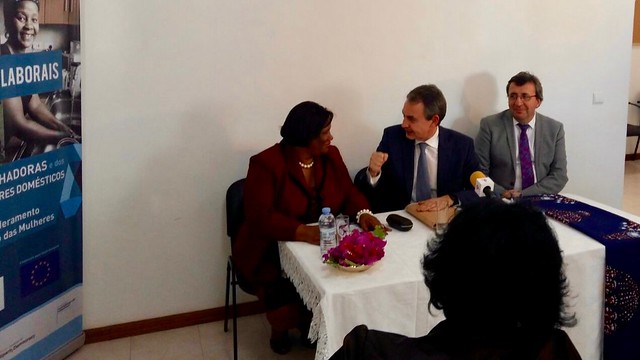José Luis Rodríguez Zapatero, member of Club de Madrid (CdM) and former PM of Spain, has just been on a mission in Praia, Cabo Verde’s capital, as part of the project INSPIRED+, an EU-funded effort in which the CdM is participating to support the implementation of core UN Human Rights and International Labour Organization (ILO) conventions. His time in Cape Verde aims at supporting a national dialogue on the inclusion of domestic workers –mostly women– in the formal economy.
“You can count on me to support any fight that adds rights. Democracy is the history of rights and there are always some more to conquer”, said Mr Zapatero in a meeting with local NGO Associação Cabo-Verdiana de Luta Contra a Violência Baseada no Género, as he recalled passing reforms on gender violence and domestic workers in Spain. According to the former Prime Minister, the more women in government the better the resulting social policies.
Around 94% of domestic workers in Cape Verde are women and only 10% are covered by social security, thus revealing this is not only a labour problem but also a gender problem. Mr Zapatero expects to bring together civil society and government around a meaningful policy reform dialogue that grants coverage to these excluded women.
The former Prime Minister of Spain spoke from experience when he recommended Cape Verdean authorities to set up a regularisation period with anonymity and no sanctions to include women in the social security system. Additionally, he believes that setting up a committee to monitor the implementation of such law is as important as the law itself. He met with Prime Minister, the Deputy Prime Minister and Minister of Finance, the Minister of Tourism and Transport, the Minister of Justice and Labour, the Minister of Education, Family and Social Inclusion, the President of the Republic.
Mr Zapatero also participated in a joint EU/ILO working session at the Cape Verdean General Assembly on forced labour and the fundamental rights of domestic workers. “A country is not measured by its nuclear capabilities, but by how it treats the weakest”, said the Spanish politician at Cape Verde’s National Assembly. He then urged this insular republic to become an example for gender equality in Africa.
His busy agenda didn’t keep him from pronouncing a speech at the University of Cape Verde and visiting community leaders at the local NGO Safende di Nos. There, he listened to the testimony of a woman who had suffered from gender violence. Mr Zapatero thanked her for being brave enough to report it to the police, as her action “avoids the suffering of other women and encourages men to reflect on the impact of their actions”.
Read more about the INSPIRED+ project here
